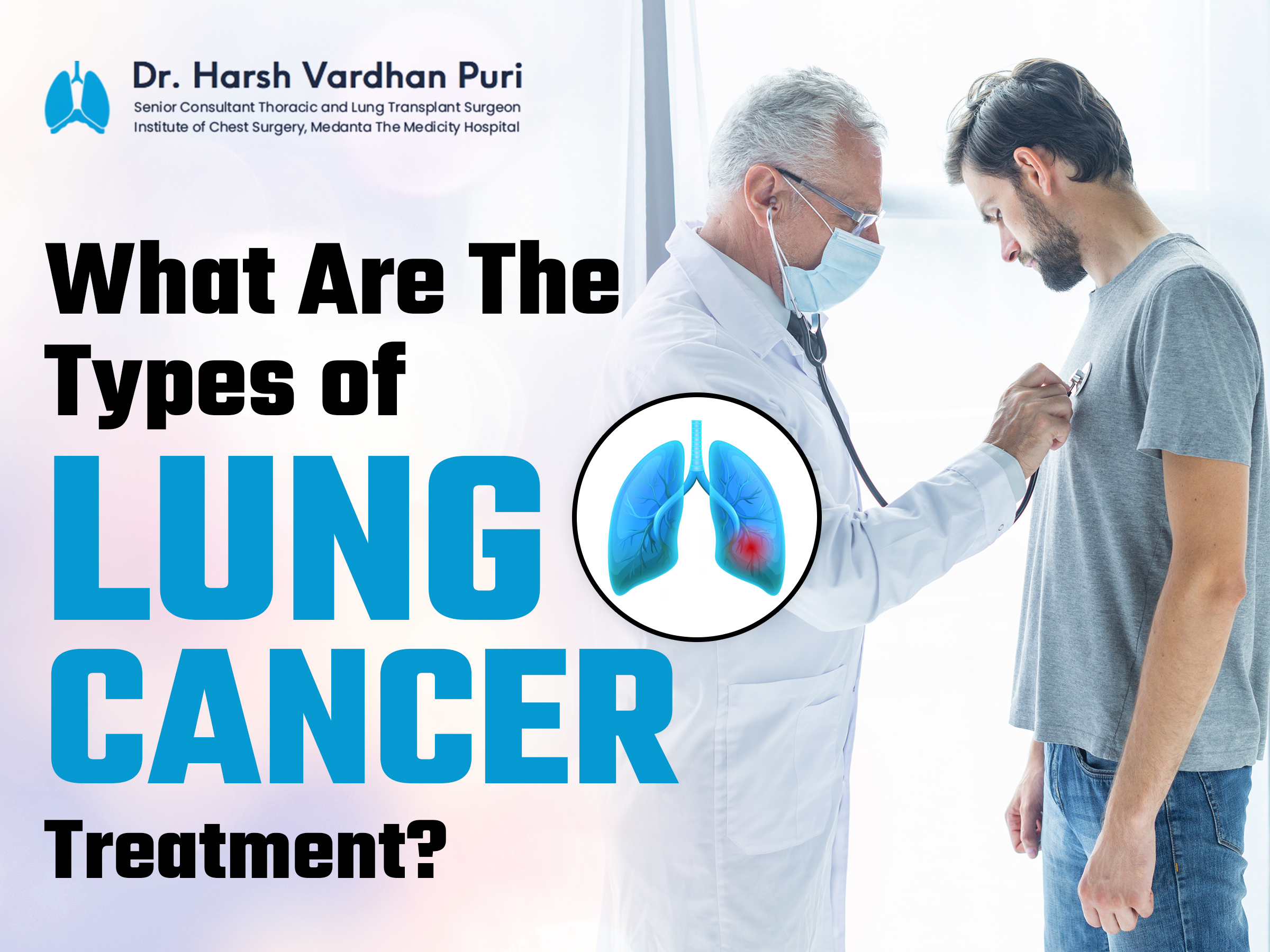CH Baktawar Singh Rd, Medicity, Islampur Colony, Sector 38, Gurugram, Haryana 122001
29 November, 2023

Navigating through the labyrinth of lung cancer treatments unveils a spectrum of options, each designed to confront this formidable opponent. It’s a landscape teeming with varied strategies, crucial for anyone confronted with the daunting diagnosis of lung cancer. The significance lies in comprehending these treatments, forming a guiding light for individuals traversing this challenging path. With clarity about these diverse approaches, individuals and their loved ones can chart a more informed and hopeful course in their battle against lung cancer. Understanding these options becomes the compass steering towards better-informed decisions and personalized care.
In the labyrinth of lung cancer treatments, early detection emerges as a beacon of hope. Timely diagnosis opens doors to a myriad of effective treatments, tipping the scales in favor of favorable outcomes. Screening, particularly for high-risk individuals, acts as the frontline defense. Imaging tests like low-dose CT scans serve as vigilant sentinels, spotting abnormalities before symptoms surface. Catching lung cancer in its infancy significantly improves treatment success, akin to snuffing out a spark before it engulfs. Early detection not only enhances treatment options but also amplifies survival rates, illuminating a path towards better outcomes.
Surgery emerges as a pivotal weapon in combating lung cancer, particularly in its early stages. Picture surgery as a refined toolkit, housing a variety of approaches like lobectomy, segmentectomy, or wedge resection, each tailored to address specific stages of lung cancer. Here’s a closer look at how these surgical strategies play out:
Each surgical technique aims to curtail the spread of lung cancer by targeting and removing cancerous tissues, thereby halting its progression and offering patients a chance for a better outcome.
Chemotherapy emerges as a formidable combatant against lung cancer cells, wielding a potent arsenal of drugs tailored to assail these rogue entities. This treatment serves as a frontline defense, designed to seek out and obliterate cancer cells wherever they lurk within the body. At times, chemotherapy stands resilient as the sole contender in the battle against cancer, harnessing its strength to halt cancer progression.
In other scenarios, it collaborates synergistically with surgery or radiation therapy, amplifying its impact to deliver a more robust blow to the disease, aiming for improved outcomes and increased efficacy in thwarting the advancement of lung cancer.
Radiation therapy assumes a pivotal role in the comprehensive arsenal against lung cancer. It operates as a precise, targeted treatment, directing focused radiation to the affected area. This concentrated energy aims at either shrinking tumors before surgery or eradicating residual cancer cells post-surgery, akin to the sharpshooting precision of a skilled sniper. The modulated radiation precisely targets cancer cells while sparing the surrounding healthy tissues from harm.
This strategy not only aims to diminish tumors but also mitigates the risk of cancer recurrence, offering a ray of hope in the fight against lung cancer by optimizing treatment outcomes and enhancing the quality of life for individuals undergoing this therapy.
In the ongoing battle against lung cancer, revolutionary advancements have emerged in the forms of immunotherapy and targeted therapy. Immunotherapy marks a paradigm shift by leveraging the body’s own immune system to identify and combat cancer cells. By enhancing the immune response, this treatment fosters a sustained attack on the cancer, potentially slowing its progression or even inducing regression.
On the other front, targeted therapy stands out for its precision. It depends on specific genetic mutations present within cancer cells. This tailored approach disrupts the mechanisms fueling cancer growth, rendering targeted therapy akin to a bespoke garment—customized and designed to thwart the specific vulnerabilities of the cancer cells. Both these cutting-edge treatments signify a leap forward in personalized care, offering new avenues and renewed hope in the fight against lung cancer.
The horizon of lung cancer treatments expands to encompass groundbreaking emerging therapies and the frontier of ongoing clinical trials. These trials stand as the vanguard, paving the way for innovative treatment pathways that could revolutionize outcomes for individuals battling lung cancer.
Emerging therapies in lung cancer treatment in Gurgaon include novel targeted therapies and immunotherapies, showcasing promising results in targeting specific genetic mutations and leveraging the body’s immune system to combat cancer cells. Furthermore, ongoing clinical trials explore experimental treatments, new drug combinations, and cutting-edge technologies, aiming to refine existing treatments or unveil entirely new approaches. These trials offer hope and the potential for groundbreaking advancements, holding the promise of improved outcomes and better quality of life for individuals on the frontlines of the lung cancer battle.
In the battle against lung cancer, a unified approach emerges as a formidable strategy. Doctors often harness a blend of treatments, resembling a symphony of medical interventions. This multidisciplinary approach harmonizes various modalities like surgery, chemotherapy, radiation, and advanced therapies to fortify the arsenal against cancer.
Surgery, a cornerstone in early-stage treatment, might be complemented by chemotherapy or radiation to eradicate residual cancer cells or prevent recurrence. Incorporating newer innovations like immunotherapy or targeted therapies further enhances this comprehensive strategy, tailoring treatments for each patient’s unique circumstances. It’s akin to a synchronized team, each intervention playing a crucial role, working cohesively to confront lung cancer on multiple fronts, aiming for improved outcomes and a more effective fight against the disease.
In navigating the complex realm of lung cancer treatments, the key takeaway is crystal clear—understanding the array of options is pivotal for tailoring effective approaches to each individual’s unique battle. This comprehension serves as a guiding light, empowering informed decisions and fostering hope in the face of adversity. For personalized insights and expert guidance on lung cancer treatments, connect with Dr. Harsh Vardhan Puri. As a leading thoracic surgeon in gurgaon expert at the Institute of Chest Surgery, Medanta The Medicity Hospital, Dr. Puri stands ready to contribute to a brighter future in the fight against lung cancer.
Category : Lung Cancer Treatment
Tags: